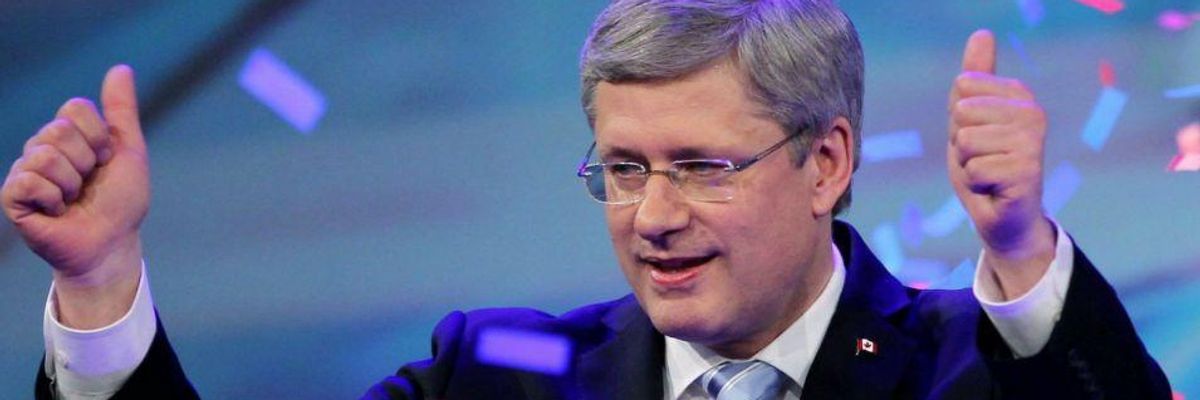Canada's 42nd federal election kicked off Sunday August 1 with a difference. This campaign will be about twice as long as usual before Canadians vote on October 19.
A long, drawn-out campaign fits the profile Stephen Harper has built for himself in politics. His goal is not to win a fair fight. This prime minister wants to destroy his opponents. A long, expensive campaign is how he plans to do it.
Negative advertising demonizing NDP leader Tom Mulcair and Liberal Justin Trudeau will be deployed to discourage people from voting for either opposition party. Millions of dollars will be spent on TV ads designed to demobilize the opposition, and encourage Conservative partisans.
Through an extended campaign of spurious accusations, and character assassination, the Harper Conservatives want to suppress the opposition vote. As people turn off politics and the campaign, the Harper Conservatives can win through the 25/60 rule. When only 60 per cent of eligible voters turn out, a party wins a majority with votes from only 25 per cent of those on the voting list. Currently the Conservatives are polling above 25 per cent, so their goal is to persuade their potential supporters to vote, and drive opponents away from the voting public.
With non-residents denied the vote, and changes to the electoral law making it next to impossible for people without a driver's licence to vote, the Harper voter suppression operation has built itself its own advantages.
The Harper tyranny is built around the ability to raise money. The Conservative base has given the outgoing government a huge war chest. They can afford an a hugely expensive campaign. The NDP and the Liberals cannot.
The Harper Conservatives changed the electoral law to allow themselves more room to spend more money. Instead of being limited to a $25 million campaign, with an additional $100,000 limit on spending by candidates per riding, the new legislation provides for extra spending for every day over the 37 day minimum for an election campaign.
So, for this campaign, under the new Harper rules the spending limit will be just over $50 million, and the riding limit just over $200,000, twice as much as the Liberals and NDP were expecting to spend.
Party electoral expenses are refundable. Allowable expenses at the riding level receive a 60 per cent refund; 50 per cent of national campaign expenses are refunded.
Refundable expenses allow the NDP and the Liberals to borrow up to one-half of their total budgets, knowing that the costs will be covered by Elections Canada. The opposition parties try and raise about one-half of what they spend from supporters, and will take out a bank loan for the other one-half.
At the end of an election, after paying back the bank loans, the opposition parties will be broke, unable to organize for another electoral campaign, until they build up their bank accounts again. This is what Stephen Harper wants to happen, and it is why he decided to take the unprecedented move of doubling the length of the election campaign.
Parties finance their elections through contributions from party members, and through public support. Legislation brought in by former Prime Minister Jean Chretien allowed for parties to receive an annual grant in proportion to their voter support in the last election.
The Conservatives killed that public subsidy, and if they win it will be gone, leaving them with a huge money advantage.
Harper knows that if he wins a minority government the other parties will be in no position to fight an early election. That is the weakness in his plan the opposition parties need to exploit.
In the event Harper faces a Parliament where the combined NDP and Liberal members outnumber the Conservatives, the opposition simply has to vote non-confidence on the Speech from the Throne opening the new parliament, defeating the government, and thwarting the Harper takeover of democracy.
Either a coalition government or a two-year accord between the two parties would allow parliament to fix the electoral rules that Stephen Harper changed to cheat his way back to power.
Before you vote, ask yourself if your preferred candidate is prepared to vote non-confidence in a Harper minority government at the earliest opportunity afforded in Parliament, which would be the Speech from the Throne.
"It's my bat and my ball, so I make the rules." The refrain of the schoolyard cheater is a poor inspiration for ruling a country.

